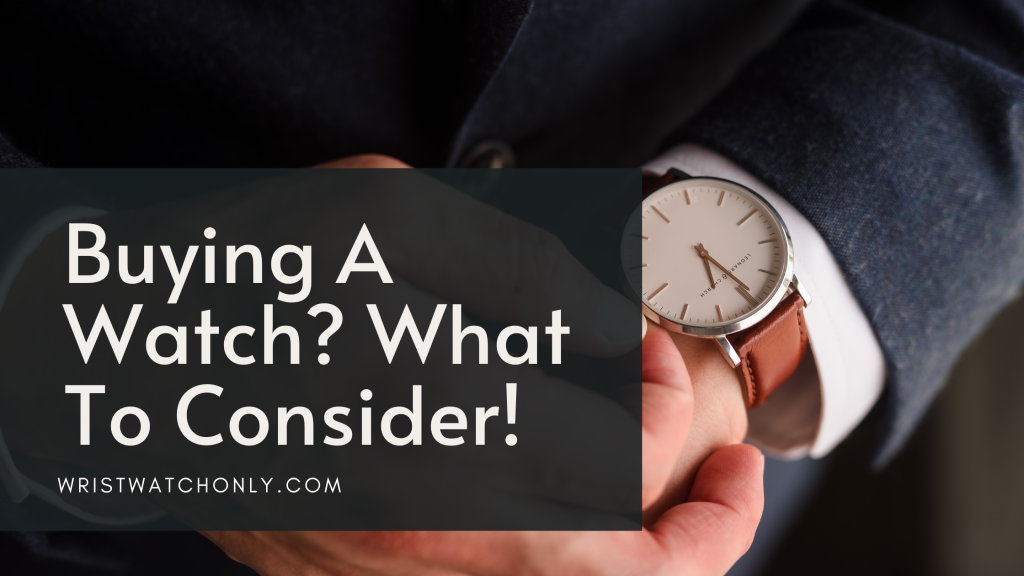Oftentimes, expensive items are looked at as investments instead of simply luxurious expenses. Sometimes, that is true. There are plenty of luxury items that gain value or at least hold some value due to the materials they are made out of.
However, many of those luxury items end up losing much of their value relatively quickly.
How does this relate to watches? Well, the average person looks at a fancy, luxurious, watch and thinks that it is something that will pay off in the long run. They treat watch buying as an investment.
Today, we want to go over whether that is a good idea or not and really cover the small details that many people miss.
Let’s get started.
Can You Make Return On Investment (ROI) With Luxury Watches?
If you do a quick Google search, the majority of answers you will get regarding buying luxury watches as investments will say it is a bad idea. That is for a good reason.
On average, no. You will not make an ROI with a luxury watch, and in fact, you will likely lose quite a bit of money. However, there are a lot of factors that go into that. We will touch on those later.
It is possible, though.
There are luxury watches from highly popular brands such as Rolex that have been around a long time, aren’t produced anymore, and see regular gains in value.
Whether you make a profit or not depends greatly on how the specific watch you purchase will perform in the long term from a market point of view, how much you paid for it initially, and whether or not people can get a hold of it.
Factors You Should Consider
There are several factors you should consider if you want to make a profit on your watch later on down the road. Some of these are extremely easy to predict, and others are fairly random.
1. The Quality of the Watch
This is a big one. A lot of people consider a $400 watch from a brand that has been around for a decade or so to be a luxurious watch. It might be a luxurious expense, but it will not produce an ROI in the future unless something completely unpredictable happens.
High-end watches that are not quite up to par with the true luxury options that cost more than the average person makes in a month or two simply do not build value.
They tend to lose their value with daily wear, people lose interest in specific models quickly, and they do not demand a high price when they are sold secondhanded.
At most, watches in the $400-$1000 range will fetch you the precious metal value associated with them if any of those materials are present.
For you to have a chance at making an ROI, you will want to look at true luxury watches that are inaccessible to the majority of people in terms of price.
2. Brand And Model Longevity
This is a two-part section.
First, you need to consider the brand. To stand a chance at scoring an ROI when you finally decide to sell your watch, you want the watch to be from a brand that is practically timeless.
For the most part, these are brands like Rolex that have been around for more than a century producing the finest products on the market.
This is because a timeless brand will actually be around and in demand when it comes time to sell your watch.
A brand that has only been around for a few years, or even a couple of decades, probably won’t be producing watching 50 years from now, and if they are, it most likely won’t have the following that the world’s top brands do.
The brand is not enough, though. Even if you were to buy a nice $7000 Rolex right now, you would likely lose money selling it. This is because people like to buy these watches new, or if they do buy them secondhanded, they want a price that reflects its wear and tear.
3. Availability And Popularity
This ties in with the previous list item. The availability of the watch has a huge impact on whether or not it generates an ROI.
Watches that are not in production anymore obviously can’t be purchased brand-new. So, potential buyers do not even have the option to get the new, in-the-box, experience that they prefer.
They have to approach previous owners if they want to get their hands on that watch, and that more or less puts them at your mercy when it comes to buying it.
However, for you to sell the watch for more than you bought it for, they have to actually want the watch.
There are new luxury watch models coming out every year, and unless you have a truly special luxury watch that people want for their collections, they will just opt for something similar.
4. Initial Buying Price
If all the other factors are in your favor, this one isn’t absolutely necessary. However, it does help you maximize your ROI in the optimal situation, and if you can consistently find great deals that are not available to everyone else, you can make an ROI in the short term by buying low and selling at MSRP.
This is the same thing stores do, but you would be doing it on a smaller scale.
Unless you are trying to get into a sort of flipping system, that second bit won’t be very useful for you, though.
If you are just looking to buy a luxury watch you can make money off of later, it is important to get the lowest price possible.
This will help compensate for any loss of value that occurs over time, and you might be able to get your money back with a bit of profit while those who purchased at full MSRP lose thousands.
Should You Buy Luxury Watches As Investments?
So, should you “invest” in luxury watches? Probably not. Unlike stocks, gold, and other assets, there are too many random variables that can depreciate your watch’s value.
The only time you should consider a luxury watch purely for investment purposes is if it’s very clear that the watch has the potential to grow in value and you can get a great deal on it.
This does not mean you shouldn’t purchase luxury watches, though.
The feeling of owning a luxury watch, whether it’s a mid-range high-end watch that costs several hundred dollars or the finest Swiss-made watches around, is incredible. It is both a status symbol and an heirloom-quality piece of equipment that will serve you well.
Also, while the watch might not make you thousands of dollars overnight, when it’s your time to move on and you pass that watch down, it will be more than just a luxury watch; it will be a piece of family heritage that means more than any possible ROI you could have made on it. That’s an investment worth making.




